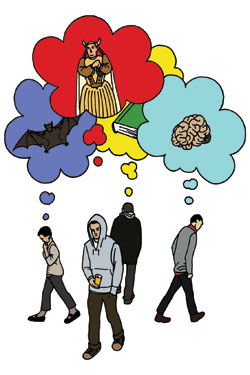
Philosophy would seem little suited to New York. It promises to yield only enlightenment, which can’t be traded on Wall Street or Twittered from Williamsburg. Improbably, though, over the past decade, this city has ascended to the top of the philosophical world. There are several narratives for how that happened. One of them centers on NYU, which in the early nineties set out to build the best philosophy department in the United States. “You could not have done that anywhere else,” says former department chair Paul Boghossian. “It’s an astonishing tribute to the city that philosophers were willing to leave places like Oxford.” Another narrative centers on the influential philosopher and opera buff Jerry Fodor, who, when offered a job here, seized the opportunity to move from Cambridge (where he taught at M.I.T.) to Manhattan. Why? So he could live within walking distance of the Metropolitan Opera, he only half-facetiously explains. The departments at Columbia and the City University were also reinvigorated, and there’s even a sprinkling of Hegelians, Nietzcheans, and phenomenologists at the New School.
What do all these people talk about? Since this is New York, you might expect to hear a lot about the philosophy of law or art or economics. In fact, there’s more excitement over the perennial deep problems.
Take the mystery of consciousness. How could subjective experience—feelings of pain and pleasure, or the ineffable taste of cinnamon—possibly arise from the gray physical processes of the brain? It was Thomas Nagel, now at NYU, who put this mystery into its starkest form with his classic paper, “What Is It Like to Be a Bat?,” and Saul Kripke, the last philosopher to appear on the cover of The New York Times Magazine, who produced a purely logical argument rebutting the widespread belief that mental states are simply brain states.
But philosophy isn’t just talk. It’s also intense, solitary thought. And that’s where the sidewalks of New York come in. Kripke used to make a habit of striding up and down First Avenue, shuffling propositions about possible worlds in his capacious head. The legendary Columbia philosopher Sidney Morgenbesser, famous for kibitzing the streets of the Upper West Side, once left for a semester in Israel—only to complain, How am I supposed to do philosophy here? There aren’t enough sidewalks!
There’s just one drawback. It’s hard to find a rock to kick in this city, à la Dr. Johnson, when you want to refute a philosophical opponent who denies the existence of material reality. But you can always kick a skyscraper.

57. Because I can leave my apartment and immediately be told, “I hope someone punches you in the face when you turn the corner.” Because the corner deli doesn’t sell Diet 7-Up but there is a plethora of bootleg Bollywood DVDs. Because no one gives me a second glance when I’m working out at the gym and tears are streaming down my face as I watch Dr. Phil conduct a meth-addict intervention.
—Jacqueline Rosokoff